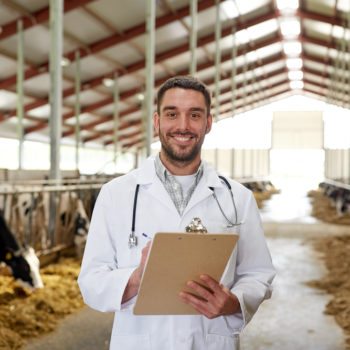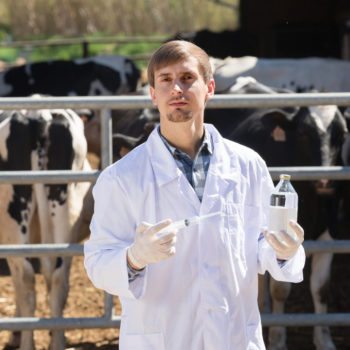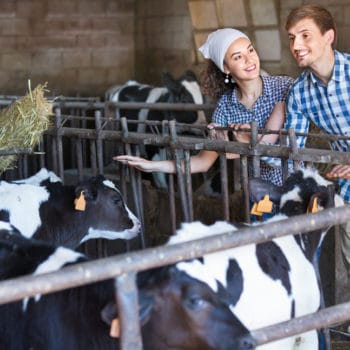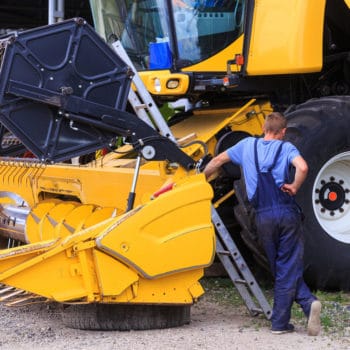Why We Love It
-
$31,850Potential Avg. Salary
-
-5.7%Job Growth Rate
-
Don't Take Work HomeCareer Attribute
-
Green JobsCareer Attribute
Farm agricultural worker is part of a broad category of agricultural jobs that include diverse work from day-to-day hands-on work on farms to overseeing specialized agricultural facilities like breeding livestock.
Recommended Schools
What is a Farm Agricultural Worker?
Duties
As a farm agricultural worker, you will need to carry out a wide range of important functions including the following:
- Assess and identify plants, pests or weeds to ensure appropriate selection and application of farm products.
- Prepare farm land for growing a variety of horticultural products such as flowers, plants, sod and trees as required.
- Keep records of crops, pesticide or herbicide usage and crop yields for the duration of work.
- Irrigate farm soil and keep a track of ditches, pipes or pumps on property
- Check livestock in their pens, cages, hutches or yards, to determine level of cleanliness or possible infection
Day In The Life
Much of your day as a farm agricultural worker will include getting plants, food or other agricultural products to markets. On the farm, your daily tasks can span a wide range of duties such as planting or harvesting crops, installing irrigation systems and breeding livestock.
If you are working in a nursery or greenhouse, you will spend time planting, seeding, pruning, irrigating, harvesting, packing and loading crops when they are ready for shipment. You will also be responsible for using pesticides, herbicides and fertilizers when required, to protect crop quality. Crops you may grow and harvest can be nuts, vegetables, fiber, grains and fruit.
If you are working on a farm or ranch as an animal farm worker, you will take care of animals such as cattle, sheep, swine, goats, horses, poultry and more. Depending on whether they are raised to supply meat, eggs or skins, your duties can include feeding, watering, herding, branding and loading animals. Administering medications, vaccinations and insecticides for livestock is also part of your job description in this case.
Work Schedule And Typical Hours
Work on a farm follows a variable schedule, instead of a 40-hour workweek. Long hours and working overtime on weekends is quite common. You will typically work outdoors in all types of weather. If your work is as an animal breeder, you will be traveling from farm to farm consulting with various ranchers and farmers on livestock issues. Harvesting and planting a wide range of crops requires frequent bending, stooping and lifting.
Most farm agricultural workers will have seasonal work schedules. However, you may have to work longer during planting or harvesting season or at times when animals require feeding or sheltering. During such times, you can expect to work 6-7 hours per week.
Growth Of The Job
This job area has good prospects in the near future, due to the rising demand for crops and other agricultural products. Newer technology is also resulting in increased output per farm worker leading to better opportunities. Direct-to-Consumer farms at a smaller scale have grown in popularity as well, preferring to hire agricultural workers instead of expensive equipment. Due to the physical nature of the work, people frequently leave the occupation so new openings are always available.
Typical Employers
Farm agricultural workers are hired at agricultural facilities, ranches and farms across the country. Employers include Farmin’ Brand LLC, Pacific Seafood Group, McCausland and Lakin Farms, Tyson Foods, Inc., Carlos & Ernestine Galicia Farms and more.
Recommended Schools
How To Become a Farm Agricultural Worker
Most farm agricultural workers receive short-term on the job training and do not need to have a high school diploma; however, a high school diploma is beneficial for those seeking positions as animal breeders. Training on farms lasts between a month to one year depending on the type of role. You will learn how to use basic farming tools and operate complex machinery while complying with safety procedures.
If you will be operating a vehicle on the road or drive a truck/tractor, you need to hold a valid driver’s license or commercial driver’s license. For supervisory positions such as crew leader or manager you should have expert knowledge in produce and livestock. Get a degree in agricultural science to eventually find work as agricultural or food scientists.
Some qualities you need to have in order to advance in this field includes physical stamina and strength. Much of the work involves laborious tasks including lifting heavy objects like crops and farm tools. Maintaining day-to-day operations on a farm requires operating complex machinery and performing routine maintenance tasks so superior mechanical skills will come in handy.
Farm Agricultural Worker Salary Data
We’ve provided you the following to learn more about this career. The salary and growth data on this page comes from recently published Bureau of Labor Statistics data while the recommendations and editorial content are based on our research.
National Anual Salary
Low Range
$21,780Average
$31,850High Range
$49,320National Hourly Wage
Low Range
$10/hrAverage
$15/hrHigh Range
$24/hrHow do Farm Agricultural Worker salaries stack up to other jobs across the country? Based on the latest jobs data nationwide, Farm Agricultural Worker's can make an average annual salary of $31,850, or $15 per hour. This makes it an Above Average Salary. On the lower end, they can make $21,780 or $10 per hour, perhaps when just starting out or based on the state you live in.
Salary Rankings And Facts
#672 Nationally for All Careers
Programs and Degrees
Here are the most common degrees for becoming a Farm Agricultural Worker. a is usually recommended and specifically a degree or coursework that prepares you for the particular field, see below.
Highest Education Among Farm Agricultural Workers
- 0.3% Doctorate
- 0.5% Masters
- 3.8% Bachelors
- 3.1% Associates
- 9.6% College
- 26.5% High School
- 56.2% Less than High School
Job Growth Projections and Forecast
2014 Total Jobs
10,6002024 Est. Jobs
10,000Job Growth Rate
-5.7%Est. New Jobs
-600How does Farm Agricultural Worker job growth stack up to other jobs across the country? By 2024, there will be a change of -600 jobs for a total of 10,000 people employed in the career nationwide. This is a -5.7% change in growth over the next ten years, giving the career a growth rate nationwide of Below Average.
Growth Rankings And Facts
#709 Nationally for All Careers
What Companies Employ The Most Farm Agricultural Workers
| Industry | Current Jobs | New Jobs Needed | % Increase |
|---|---|---|---|
| Animal production and aquaculture | 3,000 | -200 | 0% |
| Crop production | 2,000 | -300 | 0% |
| Farm product raw material merchant wholesalers | 900 | --- | --- |



















